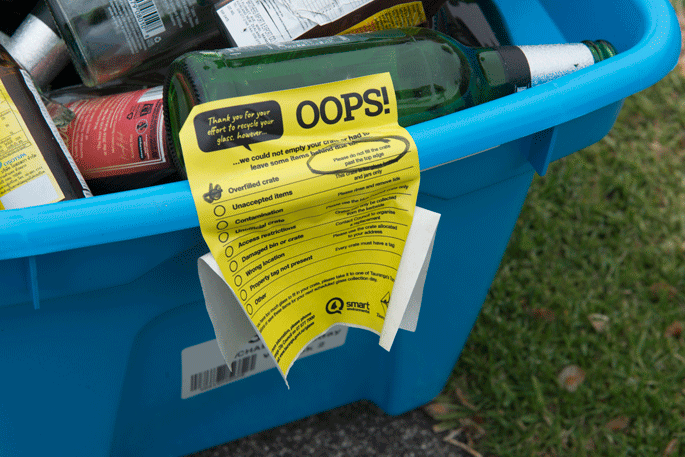In town hall parlance, it's an 'OOPS”.
And there are ten good reasons why you, as a ratepayer, will be 'OOPS'd” and your blue recycling bin will be left, unemptied, on the kerbside.
Take the neighbour who sneaked a bin brimming with evidence of his excesses out to the road early on collection day, only to find it still there, unemptied, at the end of the day. 'It's embarrassing and annoying,” he said. 'It doesn't encourage recycling.”
He had been 'OOPS'd” for an overfilled crate. Just four empty Krombacher 660s turned him from a responsible recycler to an abuser of the system.
'Thank you for your effort to recycle your glass,” said the yellow ‘OOPS!' sticker left attached to the crate, 'we could not empty your crate or had to leave some items behind due to overfilled crate. Please do not fill the crate past the top edge.”
While neighbours recovered their upturned, empty bins, the 'OOPS'd” one had to slink out and recover his still full bin of shame. The yellow sticker also suggested that if he had too much glass to fit in the crate, he could take it to one of Tauranga's transfer stations, or save it for the next scheduled glass collection day.
Across town, another disgruntled recycler had given up. His blue bin was full after just one week. He decided his glass was going into his wheelie bin and over the Kaimai Range to a landfill.
Not exactly in the spirit of recycling and exactly not what the city's waste team advocates. 'We urge residents not to resort to putting their glass in their rubbish bin as it won't be recycled,” they say.
And it seems the city is listening. The new glass recycling service is in just its second month, is well utilised by the community according to the city waste team, and is working well operationally.
There's even some independent endorsement. Waste minimisation consultant, Marty Hoffart, is upbeat. 'Smart (the recycling contractors) are good operators, they are doing a good job,” he says. And he has plaudits for the council. 'It's done a good job of rolling the scheme out.”
Anecdotally, any complaints about the new service mainly concern non-collection. And the collection records tell us just one per cent of crates have been rejected due to overfilling or contamination from unclean glass receptacles.
'This indicates that the majority of residents are using the service well,” says the waste team. 'And we are collecting almost 100 per cent of glass presented for recycling.”
But when is a filled bin too full? When it's a few bottles beyond the top edge. Even just a few bottles in an over-filled crate can fall out and smash as the bin is being lifted for emptying in the truck.
So rejecting bins because of a few bottles is not being petty or pedantic. The waste team says 'it protects collectors, pedestrians, cyclists and residents using kerbsides, footpaths and roads from broken glass.”
What about bigger crates collected more often? A once-a-week collection would probably make the scheme twice as expensive for the ratepayer.
And the bin size has been selected to maximise the amount of glass that can be collected, yet still be easy enough for the average person to lift when it's full.
It is also the optimum size for the glass collectors to lift - and they have to do it many times every day. The size is the New Zealand standard size for residential properties and has worked well for other councils. Some say it's too big, other's too small. But it seems it meets the needs of the majority of residents.
There's also the option of a second crate, which comes in at $26 for the year.
Marty Hoffart has yet another option - a deposit scheme. 'If we had a 10 cent or 20 cent deposit on beverage containers like most of Australia, most of these issues would not be issues as people would take them back to a bottle return depot to be redeemed.”

